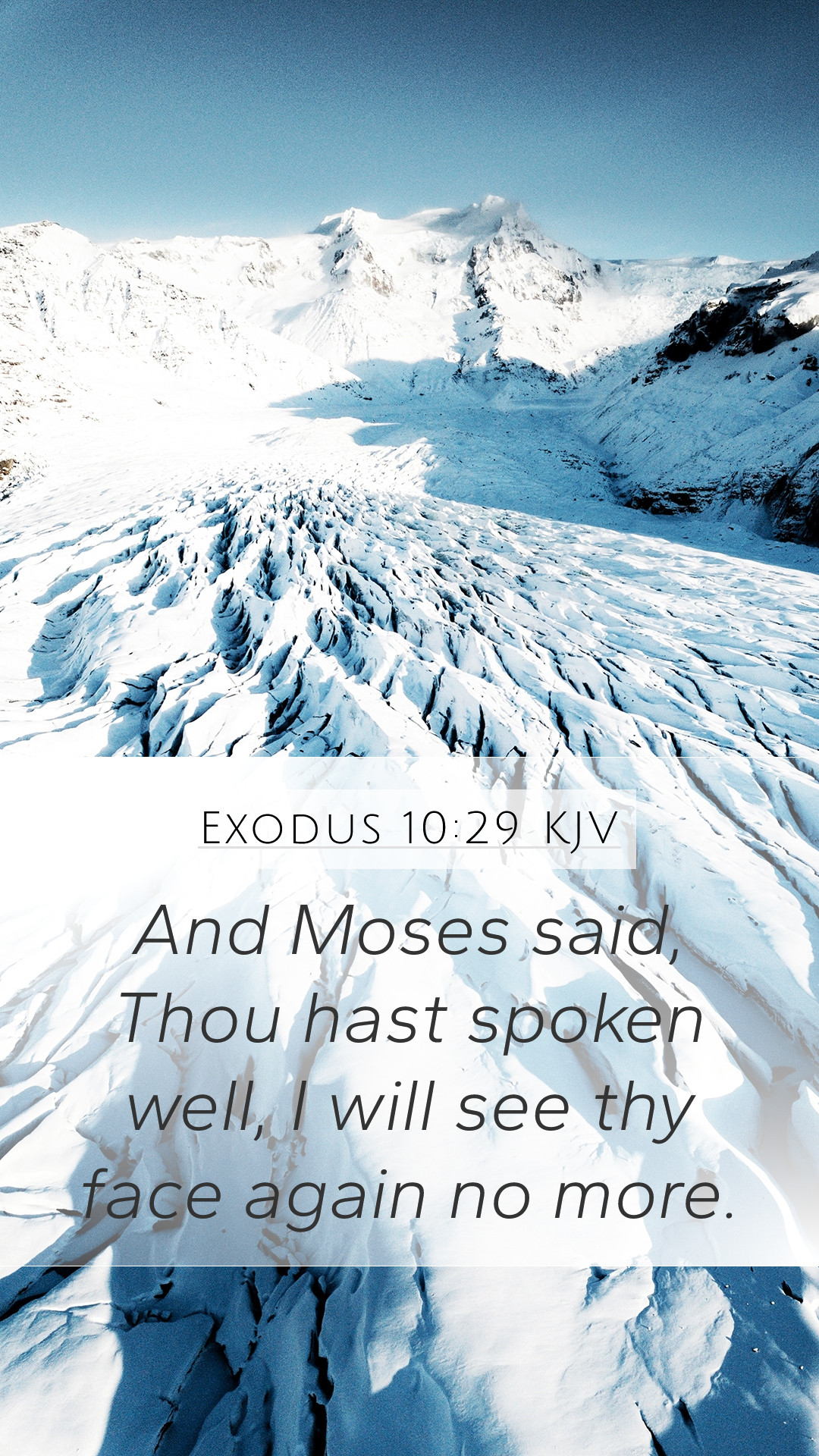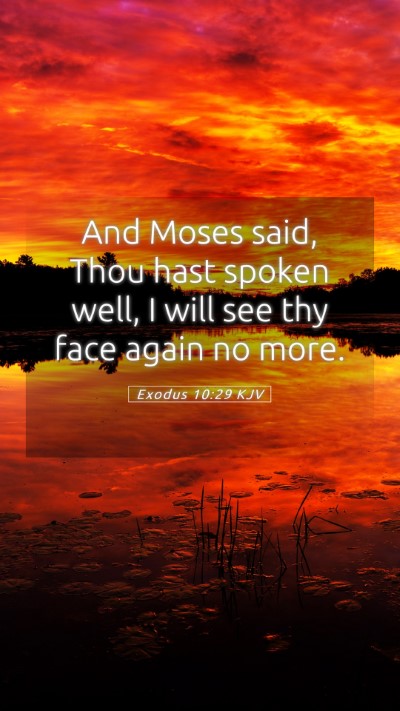Understanding Exodus 10:29 - A Comprehensive Bible Verse Commentary
Bible Verse: Exodus 10:29 (KJV) - "And Moses said, Thou hast spoken well, I will see thy face again no more."
This verse concludes a significant dialogue between Moses and Pharaoh during the final phases of the ten plagues upon Egypt. To grasp the full meaning of Exodus 10:29, we will delve into its context and theological implications, synthesizing the insights from renowned public domain commentaries.
Contextual Analysis
The Book of Exodus narrates the Israelites' struggle for liberation from Egyptian bondage, a defining moment in biblical history. Prior to Exodus 10:29, Moses has repeatedly confronted Pharaoh, delivering God's commands and warnings regarding the plagues that would befall Egypt due to Pharaoh's obstinacy.
The Exchange Between Moses and Pharaoh
In this particular exchange, Pharaoh had just expressed his anger and threatened Moses, indicating that he was tired of the plagues and desired to have control. Moses acknowledges this by affirming Pharaoh's statement, saying he will not see him again. This reflects a dividing line between the continued hardening of Pharaoh's heart and the fulfilment of God's divine plan for Israel's exodus.
Bible Verse Meanings and Insights
-
Moses' Resolve:
Moses demonstrates unwavering resolve in the face of Pharaoh's threats. This reinforces his role as a leader of God’s people, one who speaks with the authority of the Lord.
-
Pharaoh's Acknowledgment:
Pharaoh’s recognition of Moses' authority is pronounced in his speech. Commentators believe this holds prophetic significance, indicating that Pharaoh's reign is nearing its end.
-
Separation from Evil:
The phrase "I will see thy face again no more" signifies the ultimate separation that comes from rebellion against God. Matthew Henry emphasizes this point, underlining the inescapable consequences of sin.
Theological Implications
This verse emphasizes God's sovereignty over nations and rulers. Adam Clarke notes that Moses’ declaration symbolizes not just a physical departure but a profound spiritual one; Pharaoh's heart remains hardened against God. Therefore, the realization of divine judgment upon Egypt becomes evident.
Faith and Obedience
The statement by Moses serves as a testament to faith and obedience in carrying out God's commandments amidst opposition. Albert Barnes contextualizes this as an act reflecting the true summary of prophetic courage - standing firm in divine instruction while confronting worldly powers.
Application in Today's Life
Understanding Exodus 10:29 encourages believers to remain steadfast in their faith, even against formidable challenges. It emphasizes the need for discernment in recognizing when to let go of relationships or influences that impede one’s spiritual growth. Furthermore, it teaches that delivering God’s message may often lead to confrontation and misunderstanding.
Building Strong Faith
This scripture encourages individuals in Bible study groups and personal study to contemplate the implications of persistent disobedience and its consequences. Reflective study guides often cite verses such as these in their materials for deeper understanding.
Historical Context and Cross References
To fully appreciate Exodus 10:29, one must consider the entire narrative of Exodus, particularly the unfolding of God’s covenant with Israel contrasted against Pharaoh’s rebellious heart. Below are cross-references that link to the themes of disobedience and divine judgment:
- Exodus 5:2 - "And Pharaoh said, Who is the LORD, that I should obey his voice to let Israel go? I know not the LORD, neither will I let Israel go."
- Exodus 11:10 - "And Moses and Aaron did all these wonders before Pharaoh: and the LORD hardened Pharaoh's heart, so that he would not let the children of Israel go out of his land."
- Romans 9:17 - "For the scripture saith unto Pharaoh, Even for this same purpose have I raised thee up, that I might shew my power in thee, and that my name might be declared throughout all the earth."
Conclusion
Exodus 10:29 is not merely a historical account but a declaration of God's judgment, reflecting the dire consequences of sin and rebellion against divine authority. For those seeking Bible verse meanings and interpretations, this passage serves as a poignant reminder of the importance of faithfulness and the reverberating impact of disobedience.
In delineating the commentary on this verse, we embrace a holistic view that incorporates both the historical and the practical lessons applicable to contemporary life. Perhaps it is a call for believers to engage in scripture analysis and to deepen their understanding of the weighty messages woven throughout the narrative of Exodus.


